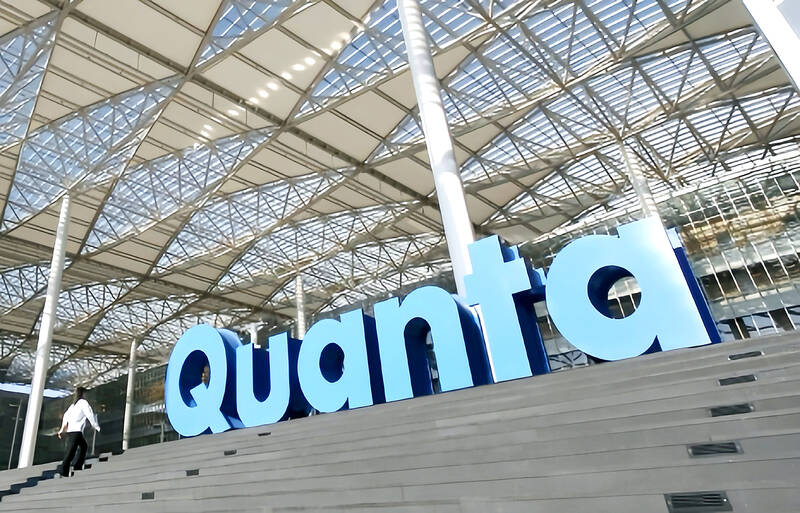Quanta Computer Inc (廣達), which supplies artificial intelligence (AI) servers powered by Nvidia Corp’s chips, yesterday said it would hike capital expenditure this year by about 40 percent annually to NT$20 billion (US$660.4 million) to keep pace with growing server demand from customers including the world’s major cloud service providers (CSPs).
The company’s move came after capital spending soared about 80 percent last quarter to NT$4.7 billion from NT$2.6 billion in the corresponding period last year. Last year as a whole, Quanta spent NT$14.2 billion on new facilities and equipment.
Quanta said it is seeing CSPs maintain heavy investment in AI servers and data center infrastructure.

Photo courtesy of Quanta Computer Inc
The recent capital expenditures guidance from top US hyper-scalers confirmed that they are either maintaining or raising capital expenditure for AI devices this year, it added.
Top CSPs said they are increasing capital expenditure, albeit at a slower pace, and “that’s why we are saying the demand is still there,” Quanta chief financial officer Elton Yang (楊俊烈) told an online conference.
However, shipments of AI server racks would still be subject to the availability of chips, Yang said.
Quanta said it started ramping up production of new AI servers based on Nvidia’s GB200 chips late last quarter, but supply constraints of chips and other components are curbing output.
For the current quarter, Quanta expects demand for GB200-based servers to outpace that for servers powered by Nvidia’s previous-generation Hopper-series chips.
As a result, AI server revenue contribution this quarter would be higher than the 60 percent of total server revenue last quarter, as the company is on track to hit the 70 percent target this year, Quanta said.
However, rising demand for new-generation AI servers is expected to squeeze gross margin going forward, after it improved to 7.92 percent last quarter from 7.45 percent the previous quarter.
Gross margin was 8.48 percent in the first quarter last year, the company said.
Servers have become the largest revenue source for Quanta, accounting for about 70 percent of its total revenue last quarter. Notebook computers’ revenue share dropped to less than 25 percent, it said.
Quanta expects notebook shipments to expand by at least a high-single-digit percentage this quarter from 10.8 million units last quarter, thanks to front-loading demand from customers during the 90-day pause on US tariffs.
That might lead to a “muted” seasonal demand in the second half of this year, Quanta said.
Quanta said its operating margin could be under pressure, as it is boosting research-and-development spending in preparation for the production of next-generation AI servers powered by GB300 chips, adding that operating expenses surged 35.4 percent annually to NT$13.88 billion last quarter.
The company’s net profit in the first quarter hit the highest in the company’s history at NT$19.5 billion, surging 61.6 percent annually from NT$12.07 billion, or sequential growth of 22.8 percent from NT$15.87 billion.
Earnings per share rose to NT$5.06 from NT$3.13 a year earlier and from NT$4.12 a quarter earlier.

In Italy’s storied gold-making hubs, jewelers are reworking their designs to trim gold content as they race to blunt the effect of record prices and appeal to shoppers watching their budgets. Gold prices hit a record high on Thursday, surging near US$5,600 an ounce, more than double a year ago as geopolitical concerns and jitters over trade pushed investors toward the safe-haven asset. The rally is putting undue pressure on small artisans as they face mounting demands from customers, including international brands, to produce cheaper items, from signature pieces to wedding rings, according to interviews with four independent jewelers in Italy’s main

Japanese Prime Minister Sanae Takaichi has talked up the benefits of a weaker yen in a campaign speech, adopting a tone at odds with her finance ministry, which has refused to rule out any options to counter excessive foreign exchange volatility. Takaichi later softened her stance, saying she did not have a preference for the yen’s direction. “People say the weak yen is bad right now, but for export industries, it’s a major opportunity,” Takaichi said on Saturday at a rally for Liberal Democratic Party candidate Daishiro Yamagiwa in Kanagawa Prefecture ahead of a snap election on Sunday. “Whether it’s selling food or

CONCERNS: Tech companies investing in AI businesses that purchase their products have raised questions among investors that they are artificially propping up demand Nvidia Corp chief executive officer Jensen Huang (黃仁勳) on Saturday said that the company would be participating in OpenAI’s latest funding round, describing it as potentially “the largest investment we’ve ever made.” “We will invest a great deal of money,” Huang told reporters while visiting Taipei. “I believe in OpenAI. The work that they do is incredible. They’re one of the most consequential companies of our time.” Huang did not say exactly how much Nvidia might contribute, but described the investment as “huge.” “Let Sam announce how much he’s going to raise — it’s for him to decide,” Huang said, referring to OpenAI

The global server market is expected to grow 12.8 percent annually this year, with artificial intelligence (AI) servers projected to account for 16.5 percent, driven by continued investment in AI infrastructure by major cloud service providers (CSPs), market researcher TrendForce Corp (集邦科技) said yesterday. Global AI server shipments this year are expected to increase 28 percent year-on-year to more than 2.7 million units, driven by sustained demand from CSPs and government sovereign cloud projects, TrendForce analyst Frank Kung (龔明德) told the Taipei Times. Demand for GPU-based AI servers, including Nvidia Corp’s GB and Vera Rubin rack systems, is expected to remain high,